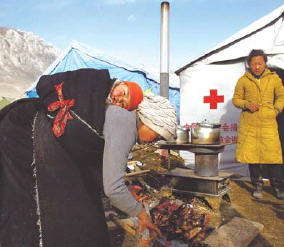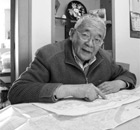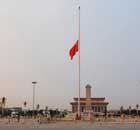Rescue & Aid
Life limping back to normal in Yushu
By Fu Jing (China Daily)
Updated: 2010-04-20 07:19
 |
Large Medium Small |
Latest:
The death toll has climbed to 2,039 from a devastating earthquake in northwest China's Qinghai Province, with 195 people still missing, according to the rescue headquarters.
As of 10 p.m. Monday, the 7.1-magnitude quake, which struck the Tibetan Autonomous Prefecture of Yushu Wednesday, has also left 12,135 injured, of whom 1,434 are in serious condition, the rescue headquarters said.
YUSHU, Qinghai -- As truckloads of food, water and tents poured in amid inclement weather, a state of relative normalcy has begun to return to Gyegu, the epicenter of a powerful tremor last Wednesday that has left 1944 people dead and 216 missing in Qinghai province.
Dispelling the gloom briefly was news of two miracle rescues.
Five days after the catastrophe, an elderly woman and her four-year-old granddaughter were pulled out from the rubble on Monday.
A woman in her 30s was also rescued at 5:30 pm after being trapped under debris for 130 hours.
Badly-needed daily necessities as well as the first batch of television sets arrived Monday morning from Xining, the provincial capital 840 km away. Earlier efforts to send aid to this remote plateau town, home to 100,000 people, had been hampered by poor road and weather conditions as well as heavy traffic.
Survivors packed temporary phone booths and charger stations on Gyegu's main street, trying to make free calls to relatives and friends or recharge their cellphones.
|
|
Jin Shan, a vendor from Henan province, and his wife were selling household necessities by their tent just outside Gyegu's King Gesar Square. They had been running a store in Gyegu, the seat of the Yushu prefecture government, for five years, and pulled out some of the goods from the rubble of their collapsed store.
Although most survivors are housed in government-issued tents, some people were still staying in the open by the side of their flattened homes.
Kunkyap, from a local rural community, was one of them. The 27-year-old bought five pairs of socks for her mother, whose ankles were injured, and other family members. Her three children - aged 7, 3 and 4 months - were all rescued from under the rubble.
"I just hope that we can find accommodation in tents as soon as possible," Kunkyap said.
Evening temperatures drop to below freezing point in Yushu, and there was a little snow and sleet on Monday afternoon.
The Ministry of Commerce said in Beijing that it had sent 3,000 stoves and some mobile shops to the quake-hit region. The stoves will arrive in Xining on Tuesday, the ministry said.
Electricity supply has been restored to pre-quake levels as of Monday morning, according to Gu Junyuan, chief engineer of the State Electricity Regulatory Commission.
Miao Wei, vice-minister of industry and information technology, said telecommunications were back to normal in all six counties in Yushu prefecture. Every village and township has been equipped with at least one means of direct contact with the rescue and relief headquarters.
Kunga, a "Living Buddha" from Derge county in Sichuan's Garze prefecture which neighbors Yushu, arrived at the quake zone a day after the disaster with 280 monks. He said they were now trying to reach more remote regions.
"Tibetan Buddhism should be a vital component in the mental recovery of the victims," Kunga told China Daily.
As Yushu is a predominantly ethnic Tibetan region, he believes survivors require the comfort of monks.
In Beijing, authorities begun to draft plans for a new Yushu, with "ecological tourism" as its pillar industry.
Xinhua and Wang Huazhong contributed to the story.












